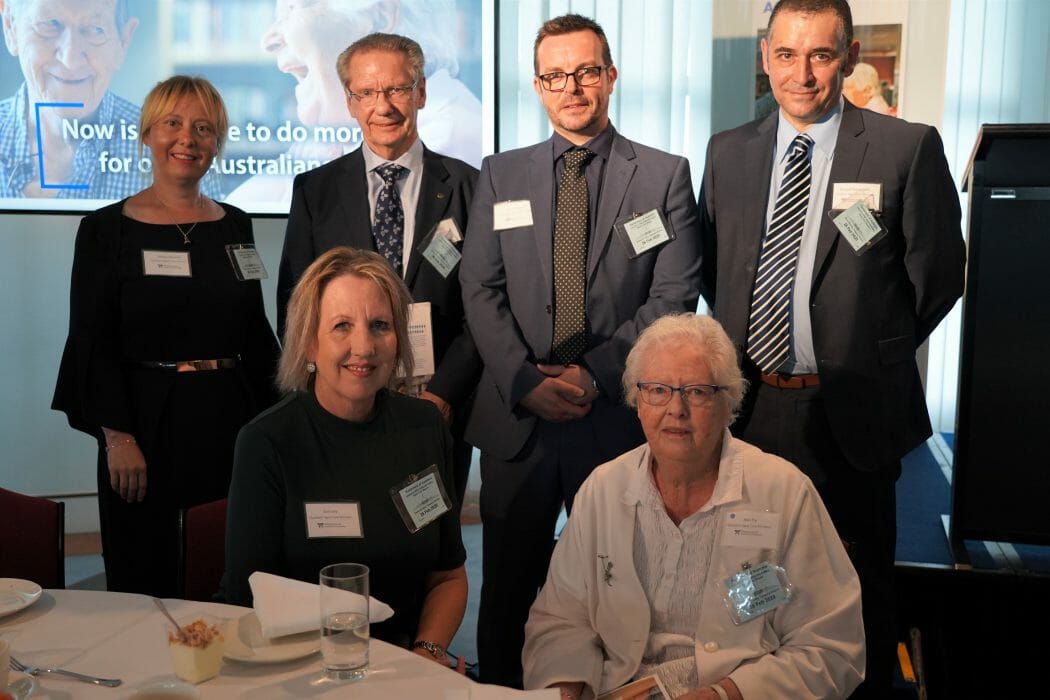Embedded pharmacist proves invaluable for residents

One year on from Goodwin hiring Australia’s first embedded pharmacist, our aged care residents and families have shared positive feedback and industry peak bodies have described our approach as best practice.
The pharmacist’s role in aged care is far more than dispensing; it is about ensuring quality use of medicines and medication reviews, which helps to aid quality of life and reduce hospitalisations.
Goodwin residents were invited to share their stories at a Pharmaceutical Society of Australia event at Parliament House on 26 February, attended also by parliamentarians and aged care industry stakeholders.
‘In my opinion, every care facility should have a pharmacist like ours’, Goodwin resident Jean Fry told the audience.
Case conferencing with the whole team, including pharmacist, ‘gave me confidence that I could make an informed decision and both understand and agree to the changes proposed,’ said Peter Heaume, son of Goodwin residents and speaker at the report launch event.
‘Elderly folk in particular generally have a multitude of ailments and drug treatment is a balancing act aimed at providing the best quality of life achievable. Pharmacists can play an important role in that, working with doctors to identify the best combination of drugs for each patient.’
The PSA report found that over 95% of people living in aged care facilities nationally have at least one problem with their medicines detected at the time of a medicines review; most have three problems.
‘Traditionally, pharmacists visit facilities to do medication reviews and they may not return to any specific facility for two to three months,’ said Goodwin pharmacist Richard Thorpe.
‘They don’t get the chance to build up relationships with facilities’ staff and the residents as I am doing at Goodwin. So this is a massive step forward.’
Everything gets down to improving the quality of life for the residents who are living here in Goodwin residential care, says Richard.
Supporting new residents
‘When new residents move into Goodwin, I’ll often sit with them and their families to review their medications. It’s a great opportunity for everyone to take stock and identify any potential issues that may have gone unchecked.’
Ongoing care team collaboration
Peter described being called to a case conference for his parents. ‘There were a large number of staff in attendance including, physiotherapy, nursing, palliative care, the doctor and the pharmacist. All aspects of care for both mum and dad were discussed. A key part of that conference was a review of the medication that my parents were taking. The pharmacist took time to explain each drug, its purpose and its method of action. From that discussion came the decision to change or withdraw each drug. I found it informative and beneficial. It gave me confidence that I could make an informed decision and both understand and agree to the changes proposed.’ He said.
‘Pharmacists are known for being effective communicators and I can quite often break down some of the knowledge barriers with medication-related issues to ensure everyone is on the same page.’ Said Richard.
‘As we age, our responsiveness to medication changes as well, so it’s important to check in with people regularly to ensure they’re responding to medications as they should, and be able to respond promptly.’
‘Each day I attend the morning handover where the overnight staff share information with the day staff. This informs me of any medication-related issues that may have arisen in the previous 24 hours and allows me to provide advice to Goodwin staff such as the registered nurses, carers, and allied health team.’
Liaison with residents’ GPs and hospitals
Richard also regularly liaises with GPs when they visit Goodwin facilities. ‘Quite often they are short on time and need to get back to their surgeries, so me being on site means I’m able to provide GPs with concise information and give them background that is useful to make management decisions regarding the medications for Goodwin residents’, he said.
‘l also asses hospital discharge summaries to make sure GPs are made aware of changes made to medications whilst their patients are in hospital.’
Through a report launched at the event, Medicine Safety: Aged Care, the Pharmaceutical Society calls for greater investment to support pharmacists to become fixtures in collaborative care teams, and to make medicine safety a national priority.
Embedding pharmacists with aged care facility teams is one of ten recommendations from the Pharmaceutical Society. They also recommend renumeration for pharmacists to participate in case conferencing, and to engage in the cycle of care through follow-up medication reviews and removing the cap on medication reviews.
Restraint-free care
The report claims also that one fifth of people living in aged care are on antipsychotics; more than half of whom use the medications for too long.
Goodwin reports the number of residents taking benzodiazepines across all our three sites has reduced by 48% since February 2019, with a large part played by the pharmacists’ presence and guidance.
Goodwin chief executive officer Sue Levy added, ‘For Goodwin, the RCP role also supports our philosophy of restraint-free care, by facilitating more considered management of psychotropics. This is an important issue for the aged care industry, associated with medicine safety as well as quality of life.’